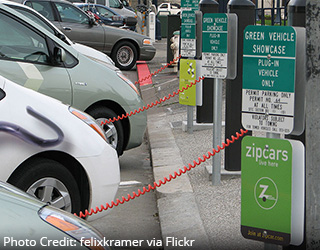EDF Climate Corps fellow | November 3, 2014
 By: Jenise Young
By: Jenise Young
“Lights, camera, action” sums up my first experience as a 2013 Environmental Defense Fund Climate Corps fellow. It was an exciting experience filming for Showtime’s “Years of Living Dangerously” while diligently working at Texas Southern University (TSU) to introduce energy retrofitting opportunities through low-cost investments.
This summer was different. The stakes were higher. I was tasked with updating TSU’s green practices by examining its faculty’s vehicular carbon footprint patterns. My findings unveiled that modern America, not just TSU, is quite dependent on personal vehicles. This was not a surprise given that a National Household Travel Survey found that almost 92 percent of American households have at least one automobile.
Because the masses like TSU students and staff are dependent on their private vehicles as a means of transportation, it’s hard to incentivize greener options like rideshare programs, biking, walking and/or public transit. Many of us (including myself) are often left will few choices beyond utilizing private vehicles. There are multiple reasons people prefer personal vehicles. Most are associated with convenience and caution like having ready transportation to respond in the case of emergencies. Personal vehicles meet our short-term needs, but we often overlook the long-term consequences linked to those choices.
I took time this summer to identify ways for TSU to begin integrating green alternatives for faculty and students. These alternatives include:
- Sharing is caring – TSU could reduce carbon and rental costs linked to renting automobiles by having faculty and students share vehicles. This could also stretch beyond rentals to sharing taxicabs and airport transfers while traveling.
- Green options in a rush – TSU and other organizations could develop an emergency vehicle pool (like a car-share program, Zip Car, etc.) for employees that use public transit and may need a vehicle ever so often for a mid-day childcare or pet crisis or personal errands.
- Incentivize green options – TSU could help change behaviors by providing incentives to employees and students that choose to participate in rideshare programs or take public transit.
- Lure the food truck frenzy – On a college campus like TSU, convenient and inexpensive food options on campus can help limit lunchtime traffic jams and would be convenient services welcomed by both students and faculty. Not to mention, reserved spaces in a parking lot could generate revenue.
I learned this summer that the choices provided by employers directly influence the behavior and habits employees maintain. By just offering greener transit options, employers have an opportunity to influence the carbon footprint of their workforce both on and off the clock.
About EDF Climate Corps
EDF Climate Corps (edfclimatecorps.org) taps the talents of tomorrow’s leaders to save energy, money and the environment by placing specially trained EDF fellows in companies, cities and universities as dedicated energy problem solvers. Working with hundreds of leading organizations, EDF Climate Corps has uncovered nearly $1.4 billion in energy savings. For more information, visit edfclimatecorps.org. Read our blog at edfclimatecorps.org/blog. Follow us on Twitter at twitter.com/edfbiz and on Facebook at facebook.com/EDFClimateCorps.